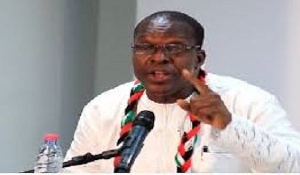In the past few days, the Second Deputy Speaker of Parliament, Alban Bagbin has been trending in the news for insulting vision impaired persons.
Let me put two things on record so as to limit the chronic and deliberate misunderstanding of some group of people.
By this write-up, I am not in anyway endorsing or supporting Alban Bagbin’s intention of becoming a presidential candidate for the National Democratic Congress, NDC. The primary purpose is to help in educating, and generating an intellectual debate on the contextual disposition of Alban Bagbin’s comment.
Let me again state that, as a trained and certified private sector advocate, and as a consultant to Business Sector Advocacy Challenge (BUSAC) Fund in the past, I have worked extensively with persons with disabilities in ensuring that certain aspects of the Persons with Disability (PWD) Act 2006 (Act 715) were implemented. I can attest to the level of deep and amazing intelligence and skills-set of people with disabilities that governments over the years have not been able to adequately deploy for national benefits.
However "The institution of chieftaincy, together with its traditional councils as established by CUSTOMARY law and USAGE, is...guaranteed". As enshrined in the 1992 Constitution. One such customs of the chieftaincy institution is that they do not accept LEADERSHIP from persons with disabilities.
History is replete with every chieftaincy institutions in Africa and the globe where generally, these institutions abhor LEADERSHIP from persons with disabilities. The chieftaincy institution does not look down on persons with disabilities or doubt the competences of such persons except when it comes to leadership positions.
This custom and tradition were developed over several years of experiences, beliefs, and practices. Some of these experiences were borne out of health, war, social perceptions, etc of which some of these might have been outmoded due to human advancement and increasing technology.
Nevertheless, institutions and systems, and for that matter, the mindset that govern institutions takes several years and sometimes long and forgotten processes to build.
It is imperative that before you initiate changes alien to an institution, the processes of reform should be carefully considered. If you do not reform the institution before imposing a change, you will offend the system. This usually result in revolts, rejection, and undermining of the intended objectives.
The nomination and appointment of Dr. Henry Daanaa indeed offended most chiefs in the country. Some paramount chiefs asked their subordinate chiefs to publicly resist it but to no avail.
Reference http://mobile.ghanaweb.com/GhanaHomePage/NewsArchive/More-Chiefs-oppose-Dr-Danaa-s-nomination-as-Chieftaincy-Minister-264220?channel=D1.
It took after some time, Nana Ansah Sasraku, chief of Mamfe and the Kyidomhene of the Akuapem Traditional Area, to urge his colleague chiefs to accept the appointment of Dr. Henry Daanaa and to work with him.
Unfortunately, that did not assuage the deep seated anger of most chiefs.
Alban Bagbin spoke in this context. He believes these events contributed negatively to the political fortunes of the NDC government in the 2016 general elections. I am of the opinion that, John Dramani Mahama’s appointment of a disabled person to a ministerial portfolio is a fulfilment of the NDC manifesto promises and was good intentioned. But the Ministry that Daanaa was appointed to, was misjudged.
As much as I am of the opinion that the chieftaincy institution need further reforms, it must be done by taking into consideration the sensitive traditional practices. Unfortunately or fortunately, this is one of the traditions that has sustain the chieftaincy institution in Ghana and most part of the world. Wisdom will tell us to give to Ceasar what is Ceasar's. There are lessons to be learned from Alban Bagbin’s comments.
The writer is a Governance and Policy Analyst
Opinions of Thursday, 23 August 2018
Columnist: Kofi B. Kukubor



















